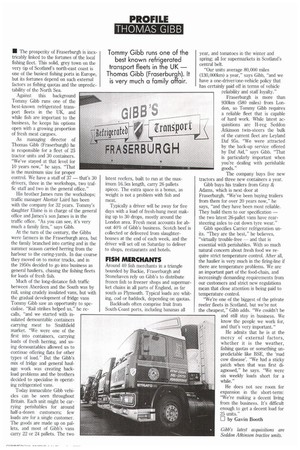PROFILE THOMAS GIBB
Page 41

If you've noticed an error in this article please click here to report it so we can fix it.
Tommy Gibb runs one of the best known refrigerated transport fleets in the UK — Thomas Gibb (Fraserburgh). It is very much a family affair.
• The prosperity of Fraserburgh is inextricably linked to the fortunes of the local fishing fleet. This solid, grey town on the very tip of Scotland's north-east coast is one of the busiest fishing ports in Europe, but its fortunes depend on such external factors as fishing quotas and the unpredictability of the North Sea.
Against this background Tommy Gibb runs one of the best-known refrigerated transport fleets in the UK, and while fish are important to the business, he keeps his options open with a growing proportion of fresh meat cargoes.
As managing director of Thomas Gibb (Fraserburgh) he is responsible for a fleet of 25 tractor units and 30 containers. "We've stayed at that level for 10 years now," he says. "That is the maximum size for proper control. We have a staff of 37 — that's 30 drivers, three in the workshops, two traffic staff and two in the general office."
His brother James runs the workshops; traffic manager Alastair Laird has been with the company for 32 years. Tommy's daughter Elaine is in charge of the general office and James's son James is in the traffic office. "As you can see, it's very much a family firm," says Gibb.
At the turn of the century, the Gibbs were farmers in the Fraserburgh area, but the family branched into carting and in the summer season carried herring from the harbour to the curing-yards. In due course they moved on to motor trucks, and in the 1950s decided to go into business as general hauliers, chasing the fishing fleets for loads of fresh fish.
Much of the long-distance fish traffic between Aberdeen and the South was by rail, using crudely insulated vans, but with the gradual development of fridge vans Tommy Gibb saw an opportunity to specialise. "Rail strikes helped us," he recalls, "and we started with insulated demountable containers carrying meat to Smithfield market. "We were one of the first into containers, carrying loads of fresh herring, and using demountables allowed us to continue offering flats for other types of load." But the Gibb's mix of fridge and general haulage work was creating backload problems and the brothers decided to specialise in operating refrigerated vans.
Today immaculate Gibb vehicles can be seen throughout Britain. Each unit might be carrying perishables for around half-a-dozen customers; few loads are for a single customer. The goods are made up on pallets, and most of Gibb's vans carry 22 or 24 pallets. The two latest reefers, built to run at the maximum 16.5m length, carry 26 pallets apiece. The extra space is a bonus, as weight is not a problem with fish and meat.
Typically a driver will be away for five days with a load of fresh-hung meat making up to 30 drops, mostly around the London area. Fresh meat accounts for about 40% of Gibb's business. Scotch beef is collected or delivered from slaughterhouses at the end of each week, and the driver will set off on Saturday to deliver to shops, restaurants and hotels.
FISH MERCHANTS
Around 40 fish merchants in a triangle bounded by Buckie, Fraserburgh and Stonehaven rely on Gibb's to distribute frozen fish to freezer shops and supermarket chains in all parts of England, as far south as Plymouth. Typical loads are whiting, cod or haddock, depending on quotas.
Backloads often comprise fruit from South-Coast ports, including bananas all year, and tomatoes in the winter and spring; all for supermarkets in Scotland's central belt.
"Our units average 80,000 miles (130,000km) a year," says Gibb, "and we have a one-driver/one-vehicle policy that has certainly paid off in terms of vehicle reliability and staff loyalty."
Fraserburgh is more than 930km (580 miles) from London, so Tommy Gibb requires a reliable fleet that is capable of hard work. While latest acquisitions are H-reg Seddon Atkinson twin-steers the bulk of the current fleet are Leyland Oaf 95s. "We were attracted by the back-up service offered by Daf Aid," says Gibb. "That is particularly important when you're dealing with perishable goods."
The company buys five new tractors and three new containers a year.
Gibb buys his trailers from Gray 8z Adams, which is next door at Fraserburgh. "We've been buying trailers from them for over 20 years now," he says, "and they have been most reliable. They build them to our specification — the two latest 26-pallet vans have rearsteering axles to cut down tyre wear."
Gibb specifies Carrier refrigeration units. "They are the best," he believes, "virtually trouble-free — and that is essential with perishables. With so much natural concern about fresh food we require strict temperature control. After all, the haulier is very much in the firing-line if there are temperature problems. We are an important part of the food-chain, and increasingly demanding requirements from our customers and strict new regulations mean that close attention is being paid to temperature control.
"We're one of the biggest of the private reefer fleets in Scotland, but we're not the cheapest," Gibb adds. "We couldn't be and still stay in business. We know the people we work for, and that's very important."
He admits that he is at the mercy of external factors, whether it is the weather, fishing quotas or something unpredictable like BSE, the 'mad cow disease'. "We had a sticky patch when that was first diagnosed," he says. "We were six weekly loads short for a while."
He does not see room for expansion in the short-term: "We're making a decent living from the business. It's difficult enough to get a decent load for 25 units."
by Gavin Booth




















































































